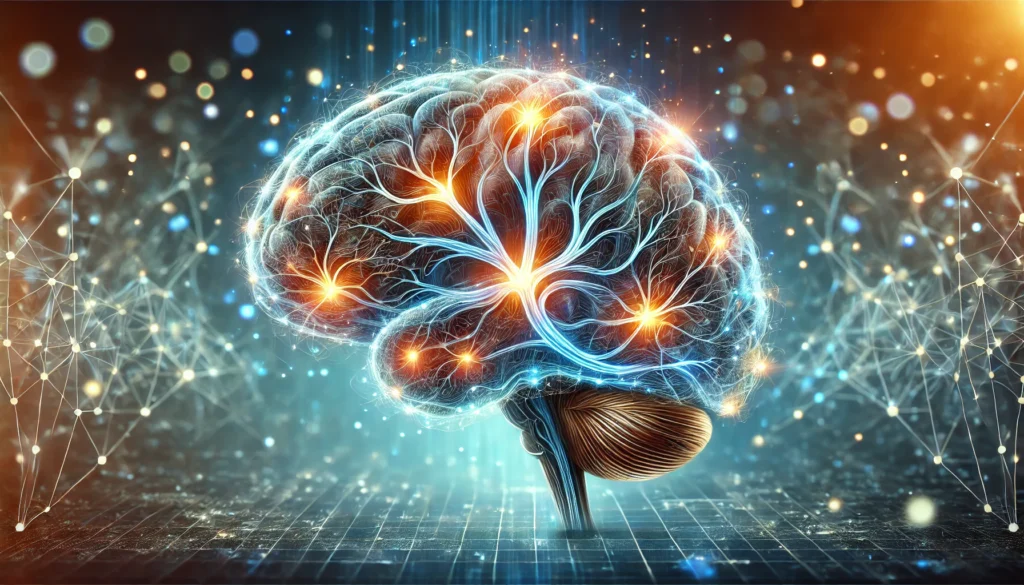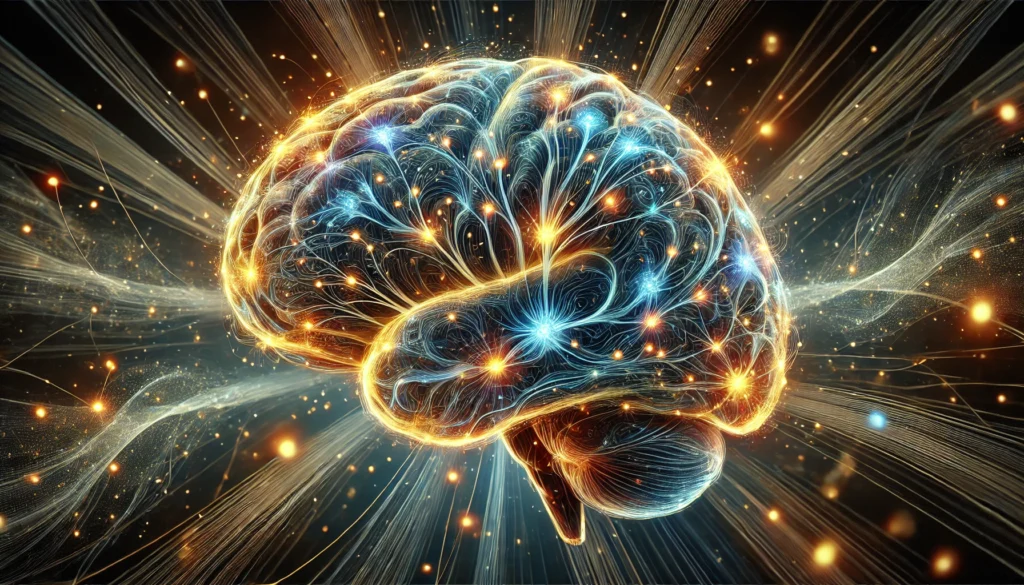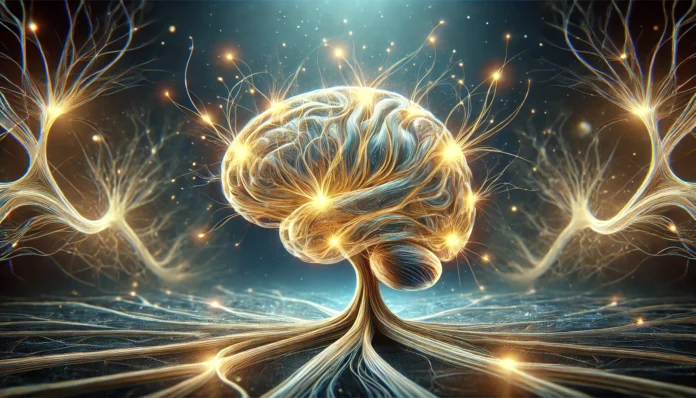Understanding Brain Nerves and Their Essential Functions
The human brain is a complex and intricate organ that serves as the command center for the entire body. It is composed of billions of neurons, which are specialized nerve cells responsible for transmitting electrical and chemical signals. These neurons, along with a network of brain nerves, play a crucial role in regulating cognitive functions, motor skills, and overall neurological health. Understanding brain nerves and their functions is essential for grasping how they influence cognitive health and longevity.
You may also like : Best Things for Brain Health: Expert-Backed Strategies to Keep Your Mind Sharp
The brain nerves can be categorized into cranial nerves and peripheral nerves, each serving distinct but interconnected roles. Cranial nerves, which originate directly from the brain, control essential sensory and motor functions, including vision, hearing, taste, and movement. Meanwhile, peripheral nerves extend from the spinal cord and facilitate communication between the brain and the rest of the body. These nerves work in tandem to regulate everything from reflex responses to higher-order thinking processes. A thorough understanding of a brain nerves diagram provides a visual representation of these intricate connections, highlighting their critical contributions to cognitive health.
Damage or dysfunction in these nerves can lead to neurological disorders, impairing cognitive abilities and reducing overall quality of life. Factors such as aging, lifestyle choices, and neurodegenerative diseases can impact the efficiency of brain nerves. By understanding their functions and how to support their health, individuals can take proactive steps toward preserving cognitive function and promoting longevity.
The Role of Brain Nerves in Cognitive Function
Cognitive function encompasses a broad range of mental capabilities, including memory, attention, problem-solving, and decision-making. These processes rely heavily on the efficient transmission of signals between brain nerves. The intricate network of neurons and synapses allows for seamless communication between different regions of the brain, ensuring optimal cognitive performance.
Memory formation and retrieval, for instance, depend on the hippocampus and its neural connections. The efficiency of synaptic transmission in this region influences an individual’s ability to store and recall information. Similarly, attention and focus are regulated by the prefrontal cortex and its neural pathways, which enable individuals to process information effectively and make informed decisions. Any disruption in the function of these nerves can lead to cognitive decline, affecting an individual’s ability to perform daily tasks and engage in critical thinking.
Neurological disorders such as Alzheimer’s disease and Parkinson’s disease highlight the importance of maintaining healthy brain nerves. These conditions are characterized by the degeneration of neurons, leading to impairments in memory, motor control, and overall cognition. By examining brain nerves and their functions, researchers can develop targeted interventions to slow cognitive decline and improve brain health over time.
The Impact of Aging on Brain Nerves and Cognitive Longevity
Aging is an inevitable process that affects all biological systems, including the nervous system. As individuals grow older, brain nerves may experience structural and functional changes that contribute to cognitive decline. These changes include the loss of neuronal connections, reduced neurotransmitter production, and increased oxidative stress, all of which can impact cognitive longevity.
One of the most significant age-related changes is the decline in synaptic plasticity—the brain’s ability to adapt and reorganize neural connections. This decline can impair learning and memory retention, making it more challenging to acquire new information or recall past experiences. Additionally, the accumulation of beta-amyloid plaques and tau tangles, commonly associated with neurodegenerative diseases, can further exacerbate cognitive decline.
Despite these challenges, research suggests that engaging in brain-stimulating activities, maintaining a healthy diet, and practicing regular physical exercise can help support brain nerves and their functions. Cognitive longevity is influenced by lifestyle choices, and individuals who prioritize mental and physical well-being may experience a slower rate of cognitive decline. By understanding the mechanisms underlying brain aging, individuals can implement strategies to protect their neural health and extend cognitive function into later years.

Strategies to Protect Brain Nerves and Enhance Longevity
Preserving the health of brain nerves requires a multifaceted approach that includes proper nutrition, physical activity, mental stimulation, and stress management. A diet rich in antioxidants, omega-3 fatty acids, and essential vitamins can support neuronal function and reduce inflammation. Foods such as blueberries, salmon, and leafy greens have been shown to enhance brain health by providing essential nutrients that promote neuroprotection.
Physical exercise is another key factor in maintaining brain nerve health. Aerobic activities, such as walking, running, and swimming, increase blood flow to the brain and stimulate the release of neurotrophic factors that support neuronal survival and growth. Additionally, resistance training has been linked to improved cognitive function, demonstrating that both cardiovascular and strength-based exercises play a role in preserving neural integrity.
Mental stimulation is equally crucial for cognitive longevity. Engaging in activities such as reading, solving puzzles, and learning new skills can strengthen neural connections and enhance cognitive resilience. The concept of neuroplasticity highlights the brain’s ability to adapt and reorganize itself in response to learning and experience. By consistently challenging the brain, individuals can maintain cognitive sharpness and reduce the risk of age-related decline.
Stress management is another essential component of brain health. Chronic stress can lead to the release of cortisol, a hormone that, in excessive amounts, can damage brain nerves and impair cognitive function. Practicing mindfulness, meditation, and relaxation techniques can help mitigate the effects of stress and promote overall neurological well-being.

Frequently Asked Questions (FAQ) on Brain Nerves and Cognitive Health
1. How do brain nerves affect cognitive processing speed?
Brain nerves play a fundamental role in cognitive processing speed by determining how efficiently signals are transmitted between different brain regions. Faster communication between neurons leads to quicker response times, sharper reflexes, and enhanced problem-solving abilities. The efficiency of these transmissions is influenced by the myelin sheath, a fatty layer that insulates nerves and facilitates rapid signal transmission. When myelin deteriorates due to aging or neurological conditions, cognitive processing speed declines, leading to slower reaction times and decreased mental agility. By maintaining a healthy nervous system through proper nutrition, mental stimulation, and physical activity, individuals can support brain nerve function and sustain optimal cognitive processing speed well into old age.
2. Can damage to brain nerves impact emotional regulation?
Yes, brain nerves are critical for emotional regulation because they facilitate communication between the limbic system and the prefrontal cortex. The limbic system, which includes the amygdala and hippocampus, processes emotions, while the prefrontal cortex regulates emotional responses and decision-making. Damage to these neural pathways can result in mood disorders, heightened emotional sensitivity, or an inability to manage stress effectively. For example, conditions like multiple sclerosis or traumatic brain injuries can disrupt neural signaling, leading to emotional instability and increased anxiety. Understanding brain nerves and their functions in emotional processing can help in developing targeted therapies for individuals struggling with mood disorders.
3. How does neuroplasticity affect brain nerves and cognitive longevity?
Neuroplasticity, the brain’s ability to reorganize itself by forming new neural connections, plays a crucial role in maintaining cognitive longevity. This adaptability allows brain nerves to compensate for damage, adjust to new experiences, and enhance learning capabilities. Engaging in activities such as language learning, musical training, or problem-solving exercises can stimulate neuroplasticity and strengthen brain nerves. Studies have shown that individuals who consistently challenge their brains through complex tasks tend to have a lower risk of cognitive decline. A detailed brain nerves diagram can illustrate how neural networks evolve over time, emphasizing the importance of lifelong learning for maintaining brain health.
4. What role do neurotransmitters play in brain nerve function?
Neurotransmitters are chemical messengers that facilitate communication between brain nerves, influencing everything from mood to cognitive function. Dopamine, for instance, is essential for motivation and reward processing, while serotonin regulates mood and sleep. An imbalance in neurotransmitter levels can impair nerve function, leading to symptoms such as memory deficits, depression, or attention disorders. Conditions like Parkinson’s disease, where dopamine-producing neurons deteriorate, highlight the significance of maintaining neurotransmitter balance. By understanding brain nerves and their functions in neurotransmission, researchers can develop more effective treatments for neurological and psychiatric conditions.
5. How do brain nerves contribute to sensory perception?
Brain nerves are integral to sensory perception, as they transmit information from the external environment to the brain for interpretation. The optic nerve, for example, processes visual data, while the auditory nerve translates sound waves into signals the brain can understand. Damage to these nerves can result in partial or complete loss of sensory functions, impacting an individual’s ability to interact with their surroundings. A brain nerves diagram detailing sensory pathways reveals how these nerves are organized and interconnected. Protecting sensory nerves through a healthy lifestyle and early medical interventions can help preserve sensory function as one ages.
6. Are there specific exercises that strengthen brain nerve connections?
Yes, various cognitive and physical exercises can strengthen brain nerve connections by enhancing neural plasticity. Activities such as meditation, tai chi, and aerobic exercise promote better circulation and nerve growth. Cognitive challenges like puzzle-solving, strategic games, and memory exercises stimulate neural pathways, improving overall brain function. Research suggests that engaging in activities that require both physical and mental coordination, such as dance or martial arts, enhances communication between different brain regions. By incorporating diverse brain-stimulating activities into daily life, individuals can optimize the health of brain nerves and their functions.
7. How does diet influence the health of brain nerves?
A diet rich in essential nutrients is crucial for maintaining the integrity and function of brain nerves. Omega-3 fatty acids, found in fatty fish and flaxseeds, support nerve cell membranes and promote cognitive function. Antioxidants in berries and leafy greens combat oxidative stress, which can damage nerve cells over time. B vitamins, particularly B6, B9, and B12, are vital for neurotransmitter synthesis and myelin sheath maintenance, ensuring efficient nerve signal transmission. A well-balanced diet that prioritizes these nutrients can help protect brain nerves from age-related decline and neurological disorders. Consulting a brain nerves diagram illustrating key neural structures can offer insights into how different nutrients support specific brain regions.
8. What are the effects of chronic stress on brain nerves?
Chronic stress can have detrimental effects on brain nerves by increasing the production of cortisol, a hormone that, in excess, can damage neural connections. Prolonged exposure to high cortisol levels can shrink the hippocampus, a region essential for memory and learning. Stress also disrupts neurotransmitter balance, leading to symptoms such as brain fog, anxiety, and difficulty concentrating. Engaging in stress-reduction techniques like deep breathing, progressive muscle relaxation, and mindfulness meditation can mitigate these negative effects. Understanding brain nerves and their functions in stress response allows individuals to implement effective strategies for protecting cognitive health.
9. Can sleep quality impact brain nerve regeneration?
Yes, sleep quality plays a crucial role in brain nerve regeneration and overall cognitive function. During deep sleep, the brain undergoes a process known as synaptic pruning, where unnecessary neural connections are eliminated while essential pathways are strengthened. Additionally, cerebrospinal fluid helps clear toxins from the brain, reducing the risk of neurodegenerative diseases. Poor sleep can impair this process, leading to memory deficits, reduced focus, and increased susceptibility to mental fatigue. Adopting good sleep hygiene practices, such as maintaining a consistent bedtime routine and minimizing blue light exposure, can support optimal brain nerve function and long-term cognitive health.
10. How do brain nerves influence longevity and overall lifespan?
Brain nerves influence longevity by regulating critical functions such as autonomic processes, cognitive resilience, and neuroprotection. Efficient nerve signaling ensures proper cardiovascular and respiratory function, both of which are essential for overall health. Additionally, cognitive resilience, which is the brain’s ability to withstand neurological stressors, plays a role in determining long-term mental sharpness. Maintaining neural health through proper lifestyle choices can slow cognitive aging and reduce the risk of age-related diseases like Alzheimer’s. Examining a brain nerves diagram that maps neural pathways provides insight into how these nerves contribute to overall physiological and cognitive longevity.

Conclusion: Optimizing Brain Nerve Function for a Healthier Future
The intricate network of brain nerves plays a fundamental role in cognitive health and longevity. From facilitating memory and learning to regulating motor functions and emotional well-being, these nerves are essential for overall neurological function. Understanding a brain nerves diagram provides valuable insights into how these neural pathways contribute to cognitive processes and how their dysfunction can lead to neurological disorders.
While aging poses natural challenges to brain nerve health, individuals can take proactive steps to support cognitive longevity. By adopting a lifestyle that prioritizes brain-boosting nutrition, regular exercise, continuous learning, and effective stress management, it is possible to preserve neural integrity and enhance cognitive function well into old age. Ongoing research in neuroscience continues to uncover new strategies for optimizing brain health, providing hope for individuals seeking to maintain their mental acuity and overall well-being.
As the field of brain health advances, it is clear that a comprehensive approach to preserving brain nerves and their functions is necessary. With greater awareness and implementation of scientifically backed strategies, individuals can take charge of their cognitive health and work toward a future where longevity is accompanied by sustained mental clarity and neurological vitality.
neural pathways and cognition, brain nerve function optimization, cognitive health strategies, nervous system wellness, neuroplasticity and brain health, enhancing mental agility, cranial nerves and their roles, optimizing brain function naturally, neurodegeneration prevention, longevity and brain health, neurotransmitters and cognition, cognitive decline prevention, brain connectivity and aging, neurological wellness practices, improving cognitive processing speed, sensory nerves and brain function, stress impact on brain nerves, sleep and neuroregeneration, brain nutrition for longevity, enhancing memory retention
Further Reading:
What is brain health and why is it important?
Systemic determinants of brain health in ageing
Neurotransmitters: Roles, Functions, and Impact on Mental Health
Disclaimer
The information contained in this article is provided for general informational purposes only and is not intended to serve as medical, legal, or professional advice. While Health11News strives to present accurate, up-to-date, and reliable content, no warranty or guarantee, expressed or implied, is made regarding the completeness, accuracy, or adequacy of the information provided. Readers are strongly advised to seek the guidance of a qualified healthcare provider or other relevant professionals before acting on any information contained in this article. Health11News, its authors, editors, and contributors expressly disclaim any liability for any damages, losses, or consequences arising directly or indirectly from the use, interpretation, or reliance on any information presented herein. The views and opinions expressed in this article are those of the author(s) and do not necessarily reflect the official policies or positions of Health11News.


